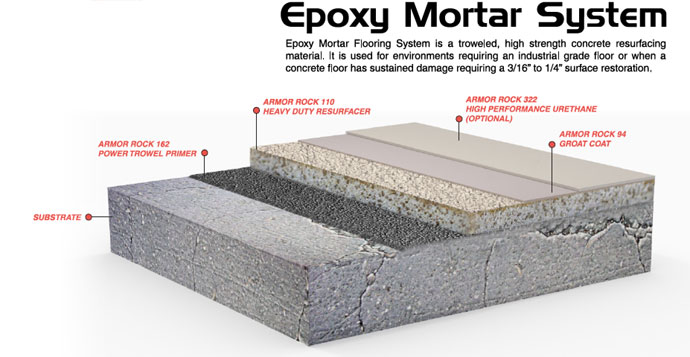
Epoxy mortar is a fast-curing, sticky resin used to set tile or patch concrete. It is resistant to stains, water and chemicals, and it is fairly shockproof, making it a popular grout choice in kitchens and bathrooms and a durable option for patching cracks in concrete, such as in a driveway. Its impenetrable nature means that it does not require a tile sealer after it sets.
Epoxy mortar comes in a two-part mix consisting of a resin and a hardener. Despite the material’s strength and durability, tile setters might be reluctant to recommend do-it-yourselfers use the product because the epoxy sets very fast. Some of these mortars have a shelf-life of less than an hour, meaning that tile setters must mix the compound and set their tile and grout quickly, with little room for error.
After a tile is in place, it is hard for it to be repositioned. Also, one must take care not to get any epoxy-style mortar or grout on the tile itself, because its sticky, fast-curing nature makes the epoxy hard to clean off. Its fast-curing nature also means that the mortar should be mixed in small batches to limit waste. Improvements have been made to mortar mixes, however. Some formulations of the mix contain detergents, which help make the compound easier to clean up.
Cost is another factor when using epoxy mortar. Epoxy mortars can cost as much as eight times as the same amount of cement-based mortar, which generally is easier to work with. Epoxy mortars also are smelly, and cement-based mortar is odorless.
Despite the cost, its odor and the extra effort required to use the compound, this mortar still has many redeeming qualities. It comes in a wide variety of colors, and its fast-curing capabilities also mean that tiles are set sooner and can be grouted sooner. Traditional cement-based mortars take days for the tile to set, then the tile must be grouted and sealed. When epoxy-style mortar is used to grout tile, it does not require sealing.
Its resistance to stains and water is perhaps the top reason for using epoxy mortar. For many informed tile setters, epoxy’s durability trumps cost and ease-of use, especially in kitchens where the mortar and grout are often used for backsplashes and countertops. The unmixed epoxy mortar compound also is touted for having an unlimited shelf life when not exposed to freezing temperatures. This means that tile setters can keep a supply in a sealed container to have on hand for repairs or other projects.
Sourced by wisegeek
Related URL : http://www.jeilchemical.com/business-areas/formulation/heavy-electrics-casting-resin/



